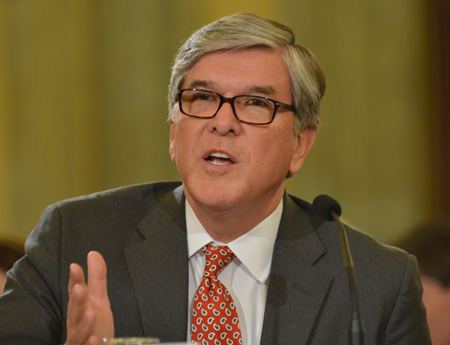NAB's Smith: We Must Do More With Less

The smarter way to stay on top of broadcasting and cable industry. Sign up below
You are now subscribed
Your newsletter sign-up was successful
Related: NAB Show 2015 Complete Coverage
National Association of Broadcasters president Gordon Smith told an NAB opening session convention audience in Las Vegas Monday that broadcasting continued to be as relevant as ever, and even more so in an age where so-called cable news was filled with partisan bickering.
He also called on broadcasters to find ways to do more with less, the more being more ways to serve their local audience, the less being the spectrum they will have after the incentive auction.
According to his speech, Smith distinguished broadcasting from its pay-TV and online competition, saying the latter was filled with debates over dress colors (blue and black, gold and white), or gossip about Kim and Kanye, or "crass and degrading" material.
As for pay TV, he slammed "so-called news" filled with a shouting contest of partisan bickering.
He cited his former colleague, Sen. Charles Schumer (D-N.Y.), who told an NAB State Leadership conference in Washington recently that with cable news so polarized and partisan, local news was even more valuable.
Local broadcast TV news, said Smith, is "where Americans turn when they want 'just the facts' with no yelling, screaming and finger pointing."
The smarter way to stay on top of broadcasting and cable industry. Sign up below
Smith suggested that broadcasters needed to paint a picture for policymakers of what life would be like without broadcasting, similar to the Potterville picture of life without George Bailey in the holiday classic It's a Wonderful Life.
"We can't take what we have for granted, and we have to work together to remind policymakers of broadcasting's immense value to their communities," he said.
Smith conceded that given the $45 billion ponied up by wireless companies for AWS-3 spectrum, "broadcasters have begun to look more seriously at the possibility of participating in the upcoming incentive auction." Fox, Ion and Tribune are among the groups that have signaled such interest.
But Smith also said the one refrain he has heard is that participation "is contingent on the FCC getting the auction rules right."
NAB has, in fact, sued the FCC to insure that it gets them right.
Smith said that means allowing the market to set the price of a channel.
"If the Commission can stay out of the way, I believe we can have a successful incentive auction," he said, but added that he was also concerned about life beyond the zeros on auction payouts. "[R]egardless of the specific outcome, I am most concerned about what emerges following the auction."
He said that following the auction, there will likely still be 80% of full power stations left, but with only 60% of spectrum—some broadcasters will likely share spectrum, which allows them to still get a payout and stay in businesses.
He said broadcasters have a "key choice." To do more or less with less. He favors more, which he says will require "the best thinking among us to devise ways and to encourage those investments necessary to preserve broadcasting's value and to be there, more important than ever in service to the American people."
Broadcasters in the room took Smith's speech to heart. “Gordon is right—if you cling to the past, you’ll be left in the past,” said Phil Lombardo, Citadel Communications CEO. “The industry continues to evolve and you have to evolve with it.”
Smith then welcomed to the stage the storied entertainer Jerry Lewis for the NAB’s Distinguished Service award. Lewis noted his 1,380 hours on television across 61 years, and the countless children who benefited from his famed Jerry’s Kids telethon that benefits the Muscular Dystrophy Association. “If it wasn’t for you, a lot of kids would be suffering worse,” he said to the broadcasters in the ballroom.
Smith and Lewis gave way to Peter Guber, founder, chairman and CEO, Mandalay Entertainment Group, who offered a fiery address on the merits of taking risks to further the engagement and immersion of consumers with one’s content. That includes virtual reality; Guber spoke of technology changing the way one can consume a pro sports event (he owns the Golden State Warriors) and a marquee awards gala (he chairs dick clark productions, which produces the Golden Globes telecast). “Broadcasters are in the best position to take advantage of this opportunity,” he said. “Challenge your incumbency.”
Those in attendance seemed to embrace the messages conveyed from the ballroom stage. “Gordon Smith is really looking for the industry to take a serious look at next generation technology,” said Kevin Cuddihy, Univision president of local media. “And virtual reality is certainly a game changer, and can be a great revenue stream.”
Contributing editor John Eggerton has been an editor and/or writer on media regulation, legislation and policy for over four decades, including covering the FCC, FTC, Congress, the major media trade associations, and the federal courts. In addition to Multichannel News and Broadcasting + Cable, his work has appeared in Radio World, TV Technology, TV Fax, This Week in Consumer Electronics, Variety and the Encyclopedia Britannica.

